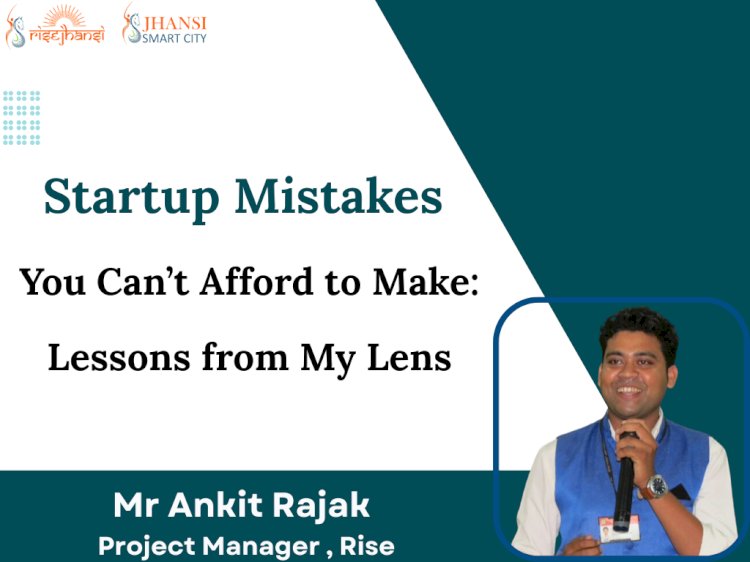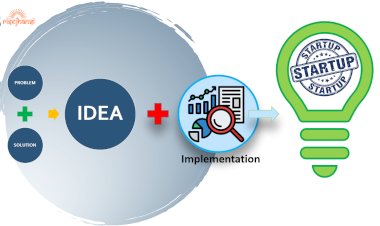Startup Mistakes You Can’t Afford to Make: Lessons from My Lens
India has become the third-largest startup ecosystem, yet many startups fail due to avoidable mistakes. Based on my experience working with 100+ startups at RISE Jhansi Incubation Center, I’ve identified four critical pitfalls: focusing on the idea instead of users, skipping idea validation, being too rigid to pivot, and trying to manage everything alone. Startups must prioritize user needs, validate their concept with real users, stay adaptable to market changes, and build a strong team for scalability. Success isn’t about the idea alone—it’s about execution, flexibility, and collaboration. Avoid these mistakes, and your startup has a better chance to thrive!

Introduction
India has emerged as the third-largest startup ecosystem in the world, yet the success rate of startups remains relatively low. While thousands of ventures are launched each year, only a fraction manage to scale and sustain in the long run.
Having worked closely with the startup ecosystem, I have observed firsthand the challenges that hinder growth and success. As a Project Manager at RISE Jhansi Incubation Center, I engage with startups daily and have been directly or indirectly involved in the operations of over 100+ startups. Through this experience, I have identified key mistakes that often lead to startup failures.
This blog serves as a case study for aspiring entrepreneurs, highlighting four critical mistakes that startups must avoid in their journey toward building a successful venture.
1️⃣ Idea-Centric Approach Instead of User-Centric Approach
One of the most common mistakes founders make is becoming overly attached to their idea without considering its practicality and relevance to users. An idea alone has no value unless it integrates seamlessly with the needs of the end user.
Why is this a problem?
Many founders assume that their idea is revolutionary, but they fail to validate whether there is a genuine demand for it. Startups that do not prioritize user needs often struggle to achieve market fit.
How to avoid this mistake?
- Think like a user from the very beginning.
- Conduct thorough market research to ensure there is a demand for the solution.
- Continuously gather and incorporate user feedback to refine the product.
The success of a startup is not determined by the brilliance of the idea, but by how well it addresses a real problem for its users.
2️⃣ Ignoring Idea Validation & Proof of Concept
Many startups invest months—or even years—developing a product without validating its feasibility. Skipping the validation stage can lead to wasted time, effort, and financial resources.
Why is this a problem?
Without testing the idea with real users, founders may overlook key aspects such as:
- Market demand – Is there an actual need for the product?
- Usability – Is the product easy to use and accessible?
- Pricing – Are customers willing to pay for the solution?
How to avoid this mistake?
- Develop a Minimum Viable Product (MVP) and test it in the market.
- Gather insights from at least 500 potential users before scaling.
- Validate the concept across multiple aspects—pricing, functionality, and sustainability.
Startups that validate their ideas early increase their chances of success by aligning with real user needs and market realities.
3️⃣ Being Too Rigid with Ideas & Assumptions
Startups must be agile and adaptable to thrive in a competitive market. However, many founders become emotionally attached to their original idea, refusing to pivot when necessary.
Why is this a problem?
A rigid mindset can prevent a startup from adapting to:
- Shifting market trends
- New technological advancements
- Evolving customer preferences
Ignoring these factors can result in loss of relevance and being overtaken by more agile competitors.
How to avoid this mistake?
- Be open to modifying business models, pricing, or product features based on market feedback.
- Use data-driven decision-making rather than relying solely on personal conviction.
- Embrace change as a strategic advantage rather than a setback.
Startups that adapt quickly to market dynamics are the ones that survive and grow.
4️⃣ Founder Occupied in All Operations Instead of Building a Team
Many founders believe they need to handle everything themselves—from product development to marketing and operations. While being hands-on is crucial in the early stages, trying to do everything alone leads to burnout and limits scalability.
Why is this a problem?
A founder who is involved in every small operational task cannot focus on high-priority activities like:
- Strategic planning
- Fundraising
- Business expansion
How to avoid this mistake?
- Build a strong team and delegate responsibilities effectively.
- Focus on high-impact tasks while trusting the team to handle operations.
- Collaborate with stakeholders, advisors, and vendors to streamline processes.
A startup grows faster when the founder leads with a vision rather than micromanaging daily tasks.
Conclusion
The startup journey is challenging, but avoiding these common mistakes can significantly increase the chances of success. Founders must:
✅ Adopt a user-centric approach rather than just focusing on the idea.
✅ Validate their concept before investing heavily in development.
✅ Stay flexible and open to market-driven changes.
✅ Delegate tasks and focus on building a capable team.
The Indian startup ecosystem is evolving rapidly, and opportunities are endless for those who navigate wisely. Startups that embrace adaptability, validation, and teamwork are the ones that will lead the future of innovation.
What has been your biggest learning in your startup journey? Share your experiences in the comments! By - Ankit Rajak
























